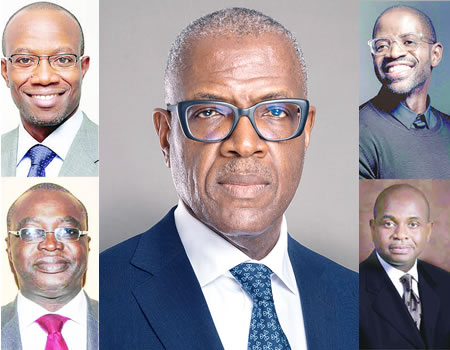The basic difference between great leaders and ordinary ones is in how they relate with their followers. Ordinary leaders manipulate and maltreat followers. They see their followers as a means to an end. They view their followers as expendables and treat them as such. As a result, they have scant respect for their views, their concerns and their persons. This is made manifest when their followers come across problems that are enmeshed in one problem or the other; rather than help them overcome same, they compound such problems. But that is not the case with great leaders. Great leaders live for their followers, they are committed to their welfare, work hard for the improvement of their followers and spare no expense to ensure that they live their dreams. For great leaders, leadership is a platform to serve others; it is an opportunity to help others, not a chance to feather their own nests.
Africa is a continent with predominantly ordinary leaders. The leaders’ ordinariness is what translates into the pedestrian and parlous state of the continent. This is why in spite of being a well-endowed region of the world, Africa is the poorest and the most troubled continent. The leaders are motivated by greed and self aggrandizement. Most African leaders are self-serving, myopic and have no interest in investing in their people. Most African leaders leave their people worse off than they met them. They use their people as a platform to entrench themselves in power, hence in Africa, power does not belong to the people in the real sense; it is hoarded by the leaders. This is not a recent development; it has been so right from the beginning. African leaders of old sold their people into slavery for pittances and gave up their land for whiskey, rifles and mirrors. The tragedy, however, is that despite current realities, the modern African leader is not much different from his forbears. He still treats his people, his most precious assets, as foot mats and will not bat an eyelid to sell them off if the price is right.
Tale from Nigeria
The international passport of a close associate expired recently and he needed to renew it because it was close to the time he needed to embark on a trip. At the Nigeria Immigration Service office where the passport was issued, he was told that passport booklets were not available and he had to wait for three months before he could get one after he had been made to pay much more than he ought to pay. After telling them the urgency of his need, he was told that he could be referred to another state where he could get the passport in a jiffy if he was willing to pay more. He readily agreed to the deal. He effected payment and set out for the neighbouring state where he was directed. At the NIS office in the neighbouring state, he was asked to pay extra if he wanted to get his passport soon enough. However, despite paying the requested amount reluctantly, he had to wait for over a week to get his passport.
Why did this happen? Scarcity of passport booklets. According to NIS officers, the scarcity of the booklets was a consequence of printing them abroad. When the associate asked why the booklets could not be printed by the Nigerian Security Printing and Minting Plc, the NIS officers could not offer any explanation. When he also sought to know why the NIS could not make proper arrangement to ensure that whoever needed a booklet got it without let or hindrance having done this over the years, no answer was provided.
The associate expended more time and money to get what he could have gotten with ease if proper leadership had been provided. He had to travel twice outside his base to get the passport and was exposed to unnecessary danger on the road because of the absence of right leadership.
Ordinary leadership makes life difficult for the people.
Marks of great leadership
Some attributes distinguish great leaders from ordinary ones. Here are some of them.
Leadership is service
For great leaders, leadership is spelt SERVICE. A great leader does not wait to be served, he serves others. He knows that the core of his calling as a leader is to serve the people under his watch. Many people who find themselves in leadership positions do not understand what it means to serve the people. Some of them may even have good intention but do not understand what is meant by serving others. In plain language serving others mean doing for them what they cannot do for themselves. By doing for them what they cannot do for themselves, a leader adds value to his people, makes them better than they were before their meeting and helps them to accomplish their aspirations.
When a leader offers service that helps his people achieve their goals, he wins their hearts and their trust. He is elevated in the thinking of the people and they are willing to do anything for him. That is what happened to Nelson Mandela of South Africa. He served the people. He did for them what they could not do for themselves. He helped them to accomplish their goals of self rule. He did not betray their trust. As a result, the people loved, trusted and adored him. He was worshipped in life and even in death.
Leaders who serve the people in truth are in turn served by the people.
Great leaders protect their people’s interests
Shepherds are leaders not just because they lead flocks but principally because they protect their sheep from external aggression and oppression. A shepherd will ignore his personal pains and nurse the hurts of his sheep. For a shepherd, life is meaningless if the flock is discomfited.
Great leaders are not as bothered about their own welfare as they are about the affairs of those under their leadership. While ordinary leaders go about looking for what they can get, great leaders are concerned about who they can help. Great leaders readily sacrifice their comfort for that of their people. They spend and are willing to be spent to protect the interest of their people. As noted by Mandela, real leaders must be ready to sacrifice all for their people.
Many leaders miss the opportunity to become great because their concern is what they can get. They get into leadership believing that it is an opportunity to amass wealth and further their personal interest. So, they go about protecting their own interest ignoring to have the back of their people. But they pay dearly for that because they forfeit the confidence of the people.
At a time in Nigeria, the President of the Nigeria Labour Congress was like the country’s alternate President. Many Nigerians believed the NLC and would do whatever it said. The NLC was so powerful that every of its directives was taken as law by the people. This was because the NLC had the interest of the people at heart; it was a real representative of the people. But it got to a point that Nigerians began to doubt the sincerity of the leadership of the labour union. The people began to believe that the NLC was trading the interest of the people away for pecuniary considerations. So, the people began to distance itself from the NLC. The last protest called by the labour body was largely boycotted by the people.
The people align with leaders who protect their interests.
Great leaders bring out the best in people
Great leaders know that it is their duty to help their people realize their full potential. In Africa, dreams die, talents are wasted and potentialities are not fully realized because the people operate under heavy burdens. These burdens inhibit creativity. As a result of these burdens, people operate below their installed capacity. So, one of the functions of a leader is to identify the factors that inhibit the ability of the people to be their best and find ways to remove such. Once that is done, the next thing is for the leader to provide opportunities for the people to express their ability and potentialities. The leader is duty bound to create opportunities for them so that their best forms can manifest.
Great leaders don’t multiply followers; they reproduce leaders by bringing out the best in their followers.
Connect with the people
A leader should not be too far ahead of the people that he fails to hear them. While a great leader should go ahead of the people to see what lies in the belly of the future before they become manifest, if he stays too far ahead of the people, he will lose touch with them and communicating with them becomes a serious problem. Leadership involves exchange of views. To know the heart cry of the people, a leader must be close to the people. It is when the leader listens to the people that he stands a chance of knowing what their challenges are. If he does not know their challenges, there is no way he can proffer solution to them. So, connecting with the people is not an option for great leaders.
A leader who does not listen to his people when they speak will have no one to respond when he calls.
Last line
The route to a leader’s greatness is the followers’ hearts. A leader who burrows his way into the hearts of the people through quality service, effective communication and mentoring makes his journey to greatness a smooth one.






